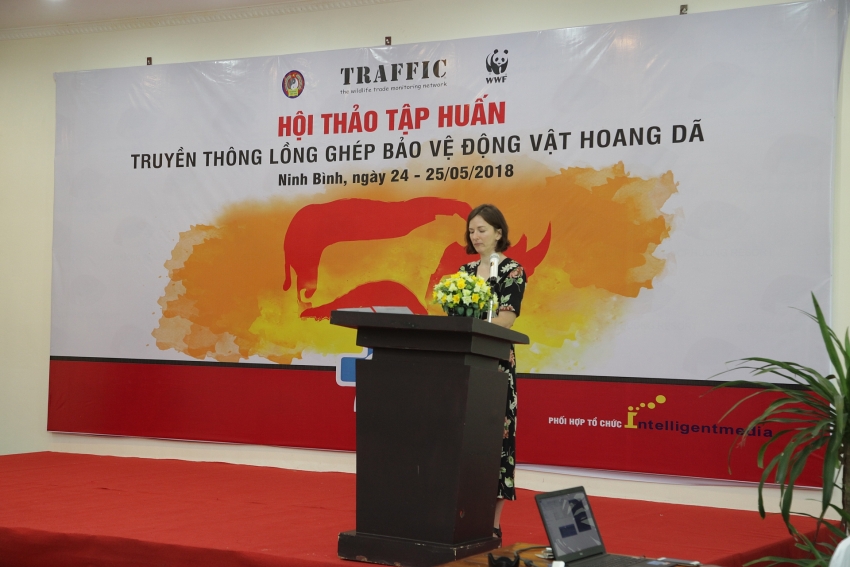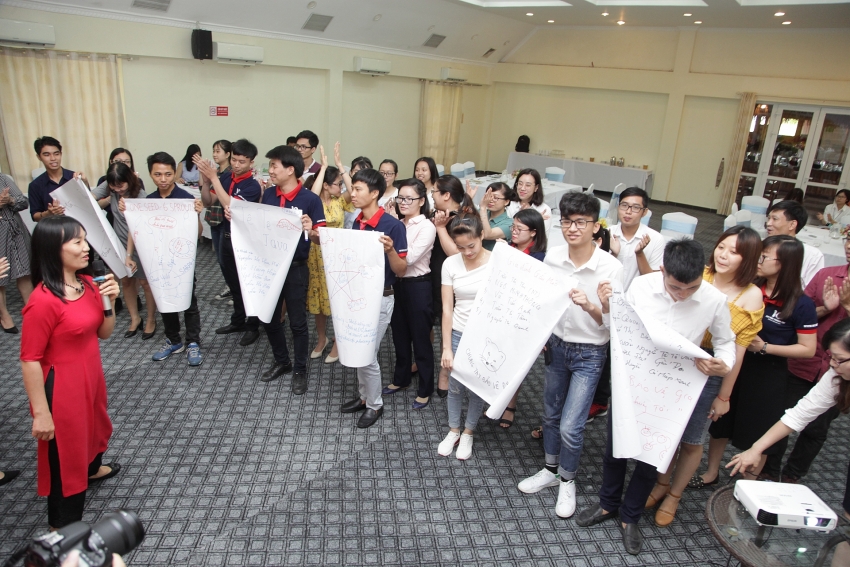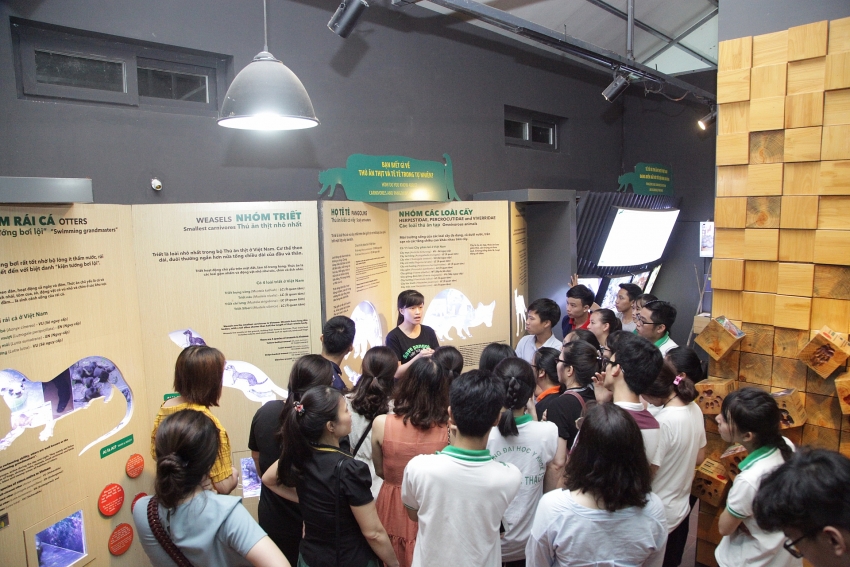Students and lecturers unite against illegal wildlife medicine
 |
| Sarah Fergusson, head of TRAFFIC's Vietnam office |
Thirty students and lecturers from Tue Tinh Medical College, Thanh Tay University, Pham Ngoc Thach Medical University, Hanoi Medical University, and Hanoi Medical College joined the workshop, which was funded by WWF Germany and organised by TRAFFIC, Vietnam Oriental Traditional Medicine Association (VOTMA), and behaviour change communication orginisation Intelligentmedia as part of their efforts to reduce demand for illegal wildlife products.
“We are committed to ensuring that traditional medicine continues to be practiced in Vietnam in accordance with the law and sustainable principles. As the tide turns against the use of illegal flora and fauna as ingredients in traditional treatments, we are working to leave a positive legacy that will endure as part of our heritage,” said Tran Xuyen Nguyen, chairman of the Professionalism Department of the Vietnam Oriental Traditional Medicine Association.
 |
| The workshop has a range of activities aimed at debunking beliefs of the medicinal properties of illegal wildlife and |
The workshop provided attendees with up-to-date information on the state of illicit wildlife trade in Vietnam in sessions held with representatives from TRAFFIC and CITES Management Authority. The event also included a session from VOTMA debunking unscientific beliefs surrounding the medicinal properties of illegal wildlife, particularly rhino horns, tiger bones, and pangolin scales. Discussions were held on alternatives that have proven benefits and can be legally sourced.
The lecturers and students were given communications guidelines and suggestions of activities to help them form effective strategies to deter the use of illegal wildlife products in formal prescriptions by TM practitioners and dispensaries to customers. The students and lecturers worked together to develop action plans that could be implemented in their respective universities. TRAFFIC and VOTMA challenged each participant to pass on the message to more than 1,000 of their classmates and colleagues.
Nguyen Van Thai, director from the Vietnamese NGO Save Vietnam’s Wildlife, led a session on how community engagement can be used to raise awareness and promote social behavioural change, using its conservation efforts for the pangolin as an example.
 |
| A lecture on species particularly endangered by illegal medicine, such as pangolins, tigers, and rhinos |
The workshop builds on recent research findings which have identified the TM sector as a priority sector in the fight against illegal wildlife trade. It is hoped that through sessions like this one, future TM practitioners can promote legal, sustainable, and socially responsible practices for sourcing and prescriptions.
To aid them in this task, TRAFFIC designed a purpose-built toolkit that was disseminated at the workshop. The kit contains a guide focusing on eliminating the use of endangered species in TM by providing suggestions for sustainable alternatives.
| With the new penal code and Vietnam’s increased law enforcement efforts, it is critical that the provision of healthcare through the sector is practiced in a legal, sustainable way to ensure the reputation of practitioners remains in high regard in Vietnam. |
The toolkit also contains important updates on Vietnam’s penal code with regards to wildlife crime. On January 1, 2018, poaching, killing, captive breeding, transporting, trading, storing, and consuming illegal wildlife became punishable by 15 years of imprisonment or a fine of up to VND15 billion ($660,000). The toolkit also features a design for a banner to be used at events and a pledge that students and practitioners can sign publicly to declare that they will not prescribe medicine containing illegal wildlife.
“Traditional medicine practitioners and students have an important role to play as champions of best practices with their peers and associates, and this toolkit helps frame a zero-tolerance approach to endangered wildlife use in traditional medicine,” said Sarah Ferguson, head of TRAFFIC’s Vietnam office.
“With the new penal code and Vietnam’s increased law enforcement efforts, it is critical that the provision of healthcare through the sector is practiced in a legal, sustainable way to ensure the reputation of practitioners remains in high regard in Vietnam,” Sarah Ferguson added.
TRAFFIC, the wildlife trade monitoring network, works to ensure that trade in wild plants and animals is not a threat to the conservation of nature. TRAFFIC works closely with its founding organisations, IUCN and WWF, making a critical contribution to the achievement of their conservation goals through a unique partnership that complements and engages the considerable strengths of each of these two major global conservation organisations.
What the stars mean:
★ Poor ★ ★ Promising ★★★ Good ★★★★ Very good ★★★★★ Exceptional
Related Contents
Latest News
More News
- Nestlé Vietnam's Lunar New Year campaign reframes how Tet is counted (January 28, 2026 | 11:40)
- Tet event in Japan celebrates success of 14th National Party Congress (January 25, 2026 | 10:04)
- 14th National Party Congress wraps up with success (January 25, 2026 | 09:49)
- Congratulations from VFF Central Committee's int’l partners to 14th National Party Congress (January 25, 2026 | 09:46)
- List of newly-elected members of 14th Political Bureau announced (January 23, 2026 | 16:27)
- 14th Party Central Committee unanimously elects To Lam as General Secretary (January 23, 2026 | 16:22)
- List of members of 14th Party Central Committee announced (January 23, 2026 | 09:12)
- Highlights of fourth working day of 14th National Party Congress (January 23, 2026 | 09:06)
- Press provides timely, accurate coverage of 14th National Party Congress (January 22, 2026 | 09:49)
- Press release on second working day of 14th National Party Congress (January 22, 2026 | 09:19)

 Tag:
Tag:


























 Mobile Version
Mobile Version